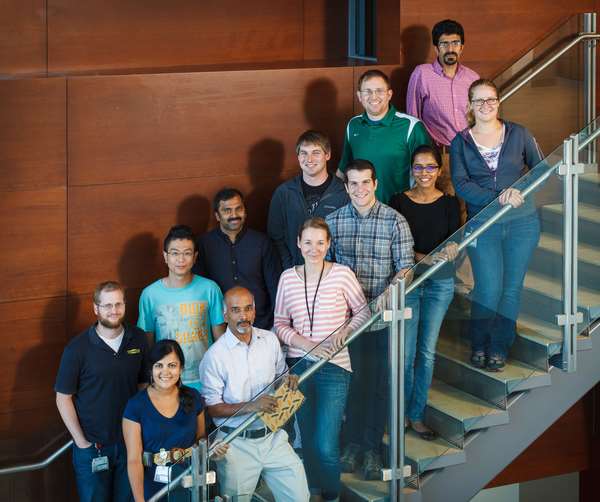
Subramaniam Malarkannan, PhD
Professor and Gardetto Chair for Immunology and Immunotherapy; Professor, Medicine (Hematology and Oncology) and Microbiology & Immunology; Senior Investigator, Versiti Blood Research Institute
Locations
- Microbiology & Immunology
Contact Information
General Interests
Education
Research Interests
Our laboratory studies the basic biology and clinical utilization of NK cells. The following are the major areas of our focus:
I. NK cell-mediated Immunotherapy
NK and T cells hold significant promise in formulating novel cellular immunotherapies targeted to chemo-resistant/relapsing malignant hematopoietic and solid tumors. Chimeric Antigen Receptor (CAR)-based NK or T cell-mediated cellular immunotherapy offers hope. However, CAR-mediated therapy also causes a deleterious pathological condition called, 'cytokine-release syndrome' (CRS), a potentially fatal condition. In this context, our lab is interested in defining the signaling cascades by which anti-tumor cytotoxicity and induction of inflammation are individually regulated in NK and T cells. Our recent study using unmanipulated NK cells identified a unique Fyn-ADAP-Carma1 signaling pathway that is exclusively responsible for the production of inflammatory cytokines, not anti-tumor cytotoxicity. We are currently working to engineer a ‘CRS-free-CAR’ therapy.
II. Spacetime relationship of signaling events in NK cells
Spaciotemporal organization of signaling events in lymphocytes are poorly understood. Hundreds of signaling molecules take part in transducing membrane proximal events into cellular functions. However, the precise mechanisms that co-ordinate and contain a pathway remain elusive. Scaffolding proteins provide insights into how signaling events can be spatiotemporally coordinated. IQGAP1 is a 190 kDa cytoplasmic scaffolding protein. Based on our preliminary work, we identify multiple scaffolding functions for IQGAP1.
First, IQGAP1 regulates the terminal maturation and subset specification of NK cells. Second, IQGAP1 forms a novel signalosome around the perinuclear region to regulate ERK1/2 activation via Rac1→Pak→Raf→MEK1/2 pathway. Third, IQGAP1 plays a central role in actin polymerization, microtubule elongation and MTOC formation, which are important for the immunological synapse formation, tumor lysis and cell movement. Our work will provide crucial insights into how scaffolding proteins regulate the development, maturation and effector functions of NK cells.
III. Metabolic Reprogramming in NK Cells
NK Cells are crucial in mediating anti-tumor cytotoxicity. Transition of ‘resting’ to an ‘activated’ NK cell status requires a significant change in its bioenergetic requirements However, the molecular mechanism that regulates this metabolic reprogramming in NK cells is yet to be defined. When and how NK cells switch to ‘Warburg’ metabolism is central to formulating successful therapeutic approaches of cancer treatment.

Using two scaffold proteins, IQGAP1 and KSR1 that are predominantly expressed in lymphocytes, as molecular models we have uncovered a novel mechanism that is central to the metabolic reprogramming of NK cells. NK cells from Iqgap1-/-,Ksr1-/-, and Iqgap1-/-Ksr1-/- mice displayed a significantly impaired pattern of oxygen consumption rate (OCR) and extracellular acidification rate (ECAR), demonstrating an impaired mitochondrial function. In addition, lack of IQGAP1 and/or KSR1 significantly altered B-Raf/C-Raf→MEK1/2→ERK1/2→RSK1→ S6S235/S236 and PI3K-p85a→PDK1→AKT1T308→mTORC1→S6K1→S6S240/S244 signaling pathways. Results will provide novel insights into how two scaffold proteins IQGAP1 and KSR1 regulate the metabolic reprogramming of NK cells.
Publications
-
Osteoclast-expanded supercharged NK cells perform superior antitumour effector functions.
(Ko MW, Mei A, Senjor E, Nanut MP, Gao LW, Wong P, Chen PC, Cohn W, Whitelegge JP, Kos J, Kaur K, Malarkannan S, Jewett A.) BMJ Oncol. 2025;4(1):e000676 PMID: 40510443 PMCID: PMC12161327 06/13/2025
-
(Huerta-Yepez S, Chen PC, Kaur K, Jain Y, Singh T, Esedebe F, Liao YJ, DiBernardo G, Moatamed NA, Mei A, Malarkannan S, Graeber TG, Memarzadeh S, Jewett A.) BMJ Oncol. 2025;4(1):e000618 PMID: 40196236 PMCID: PMC11973776 04/08/2025
-
(Lauener MP, Tanaka E, Mei A, Abdossamadi S, Ostroumov E, Geltink RIK, Malarkannan S, Schultz KR.) Cytotherapy. 2024 Dec;26(12):1472-1483 PMID: 39127925 SCOPUS ID: 2-s2.0-85200915654 08/11/2024
-
(Lella RK, Malarkannan S.) Cell Mol Life Sci. 2024 Nov 25;81(1):462 PMID: 39585462 PMCID: PMC11589066 SCOPUS ID: 2-s2.0-85210079995 11/25/2024
-
Transcriptomic diversity of innate lymphoid cells in human lymph nodes compared to BM and spleen.
(Hashemi E, McCarthy C, Rao S, Malarkannan S.) Commun Biol. 2024 Jun 25;7(1):769 PMID: 38918571 PMCID: PMC11199704 SCOPUS ID: 2-s2.0-85196869670 06/26/2024
-
(George B, Kudryashova O, Kravets A, Thalji S, Malarkannan S, Kurzrock R, Chernyavskaya E, Gusakova M, Kravchenko D, Tychinin D, Savin E, Alekseeva L, Butusova A, Bagaev A, Shin N, Brown JH, Sethi I, Wang D, Taylor B, McFall T, Kamgar M, Hall WA, Erickson B, Christians KK, Evans DB, Tsai S.) Gastroenterology. 2024 May;166(5):859-871.e3 PMID: 38280684 SCOPUS ID: 2-s2.0-85188891214 01/28/2024
-
(Chen V, Zhang J, Chang J, Beg MA, Vick L, Wang D, Gupta A, Wang Y, Zhang Z, Dai W, Kim M, Song S, Pereira D, Zheng Z, Sodhi K, Shapiro JI, Silverstein RL, Malarkannan S, Chen Y.) Front Cardiovasc Med. 2024;11:1436865 PMID: 39156133 PMCID: PMC11327822 SCOPUS ID: 2-s2.0-85201434395 08/19/2024
-
(Kumar P, Rajasekaran K, Malarkannan S.) Crit Rev Immunol. 2024;44(1):55-77 PMID: 37947072 SCOPUS ID: 2-s2.0-85176452937 11/10/2023
-
(Kaur K, Chen PC, Ko MW, Mei A, Huerta-Yepez S, Maharaj D, Malarkannan S, Jewett A.) Crit Rev Immunol. 2023;43(1):1-11 PMID: 37522557 SCOPUS ID: 2-s2.0-85160646811 07/31/2023
-
(Kaur K, Chen PC, Ko MW, Mei A, Senjor E, Malarkannan S, Kos J, Jewett A.) Front Immunol. 2023;14:1132807 PMID: 37197660 PMCID: PMC10183580 SCOPUS ID: 2-s2.0-85159769580 05/18/2023
-
(Kaur K, Chen PC, Ko MW, Mei A, Huerta-Yepez S, Maharaj D, Malarkannan S, Jewetta A.) Critical Reviews in Immunology. 2023;43(1):1-11 SCOPUS ID: 2-s2.0-85160646811 01/01/2023
-
(Kaur K, Chen PC, Ko MW, Mei A, Chovatiya N, Huerta-Yepez S, Ni W, Mackay S, Zhou J, Maharaj D, Malarkannan S, Jewett A.) Cells. 2022 Oct 31;11(21) PMID: 36359827 PMCID: PMC9656116 SCOPUS ID: 2-s2.0-85141563829 11/12/2022

